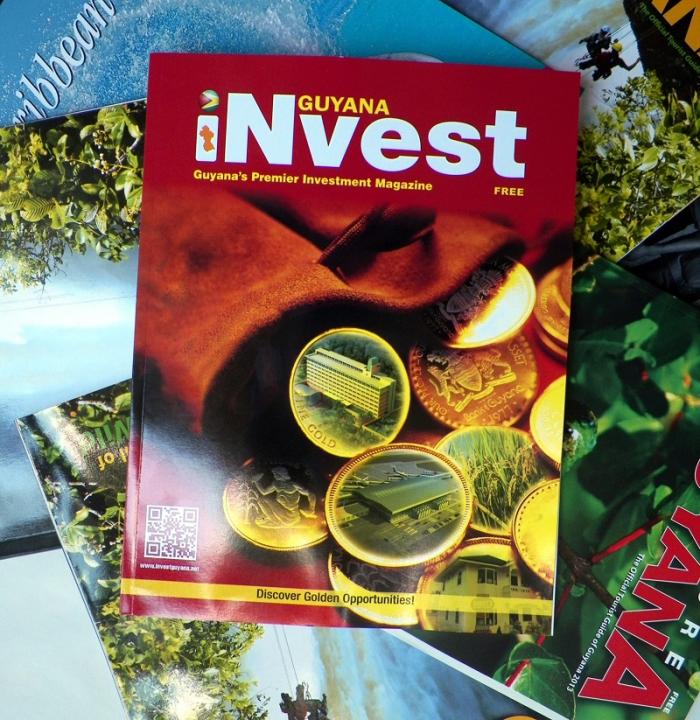The five or six tiny Guyana flags strung up outside the Firefighters Memorial Bldg at 8000 NW 21st St. in Doral, Florida did not at all signal the large claims which would be made by the featured speaker at the Invest Guyana event held there on the 23rd May 2013.
This event organised by the CARIBUSA (Caribbean/ USA business Network) under the good guidance of Michael Mathews, President of the Caribbean Trade Center and true Caribbean Man from the land of the hummingbird, frequently mooted as sweet, sweet, sexy T&T, had as its featured speaker the Minister – Tourism, Industry & Commerce from the land with the long-standing reputation for hospitality – Guyana.
Held in conjunction with the Guyana Consulate in Miami and ably supported by Ms. Sandra Baptiste’s editorial efforts in bringing a new edition of Guyana’s premier investment magazine ‘Guyana Invest’ to this Invest Guyana forum. It was supported by a range of sponsors and supporters including SeaFreight Agencies, Laparkan, Caribbean Airlines, Suriname Airways, Medical Tourism Association, T&T South Florida Chamber of Commerce, and Latinbiz among others, and Plaques of appreciation were presented to all the sponsors by the CTC.
Promising to dispel the idea long held by some diasporic Guyanese and others that Guyana remained unsuitable for investment the Minister let loose a barrage of facts and figures designed to convince his audience that the country had an investor-friendly climate which was assured by appropriate legislation, investor concessions and it’s participation in a number of free trade agreements with Caricom, Canada, Latin America, and the Caribbean Basin Initiative (CBI) with the United States.
As a consequence of these agreements and others, he said the country was a gateway for easy access to markets in Latin America and the Caribbean region which comprise 33 countries, with a population of 580 million people, and which has a regional GDP of US$ 4.9 trillion (at current prices), and reports of approximately US$1.6 trillion in merchandise trade annually – accounting for 6% of the world’s total.
Quoting from statistics in the reports on the country by the Global competitiveness report – World Economic Report 2012-2013, and from the Go Invest website among other sources he offered the following:-
• “Guyana is one of the few countries in Latin America and the Caribbean to post real positive economic growth over the last six years in spite of the sluggish global economy. Based on the official statistics, the country recorded positive economic growth for six consecutive years, averaging 4.5 percent between 2007 and 2012.”
• “The country has attracted unprecedented foreign direct investment totaling US$1,326.4 million between 2006 and 2012. Domestic investment also expanded exponentially over the same period, as reflected by the growth in credit to the private sector which increased from G$30.6 billion in 2006 to $82.6 billion during 2012.”
“Some of the general incentives which currently exist for all investors include:-
• Zero rate on Customs Duty and Consumption Tax on most plant, machinery and equipment
• Zero rate on Customs Duty and Consumption Tax on raw materials and packaging materials used in the production of goods by manufacturers and small businesses
• Unlimited carryover of losses from previous years
• Accelerated depreciation on plant and equipment
• Full and unrestricted repatriation of capital, profits, and dividends
• Benefits of double taxation treaties with the UK, Canada, and CARICOM countries.
Apart from the aforementioned incentives, there are also sector-specific incentives. For instance, firms producing non-traditional exports may also benefit from special export allowances; with the actual amount deducted from income tax ranging from 25 percent to 75 percent of export profit.”
With regard to the power supply which has for decades been a tremendous problem in Guyana, he quoted a 2011 report from the Caribbean Electric Utility Services Corporation (CARILEC), which said that “the prices for domestic electricity in Guyana was the fourth lowest in the Caribbean.” He offered too that “Currently the government is in the process of constructing the Amaila Falls Hydropower Project; which will be the flagship of Guyana’s Low Carbon Development Strategy. When fully commissioned, the Amaila Falls Hydro Electric Plant will be enormously beneficial to all Guyanese, especially manufacturing businesses since it:
• It will improve the reliability of the energy supply in Guyana by providing up to an estimated 165 MW of renewable energy; and
• Contribute to a reduction in the current cost of electricity ranging between 20 to 40 percent.”
He went on to say that “Apart from the low cost of electricity, Guyana has one of the lowest wage rates in the Caribbean and Latin America, and the workforce was highly literate and trainable.”
Quoting from the World Economic Report 2012 -13 he said that
“Guyana is ranked 50 Compared with a ranking of 109 for Jamaica, 66 for Suriname, 34 for Trinidad and Tobago” in terms of the quality of its educational system, Guyana is ranked 42 compared with a ranking of 76 for Jamaica, 84 for Suriname, and 40 for Trinidad and Tobago.
In terms of the quality of management schools, Guyana is ranked 64 compared with 77 for Jamaica, 63 for Suriname, and 36 for Trinidad and Tobago. Given our intention to improve the suitability of our workforce for the private sector, the government has recently established two new technical institutes and strengthened the existing institutions.
Currently, the approximately 3,500 persons who are trained annually in technical and vocational areas and the manufacturing sector benefit from in-firm training provided by NGOs and large manufacturing and utility companies, such as DDL, Banks DIH, GUYSUCO, Guyana Power, and Light. Greater emphasis is also being placed on programmes offered by the University of Guyana in the areas such as mathematics, engineering, and information technology; all of which are aligned to the priority sectors. Last year, for instance, the Government entered into a US$10 million loan agreement with the CDB to upgrade the science and technology programmes at the University.”
In addition to these facts, he indicated that interest rates on bank loans had come down from “42% to just 8%”, and that the number of hotel rooms in the country had moved from hundreds to thousands and is set to further increase.
All in all, with the duties of Master of Ceremonies of the event in the capable hands of Mr. Wesley Kirton of Laparkan, it was for me like the painting of a painting. It was too prolonged, astonishingly revelatory, and in terms of the minister’s claim of social cohesion in Guyana, with a bit too much adornment. I do think though that his revelations were an eye-opener for the attendees, many of whom might well be stuck with the idea of Guyana as unsuitable for serious investment. He revealed that “Guyana was, in terms of economic growth in the Caribbean and Latin America, number two just behind Peru.” Something truly astonishing and revelatory.
Errol Ross Brewster
Aventine at Miramar
25th May 2013






